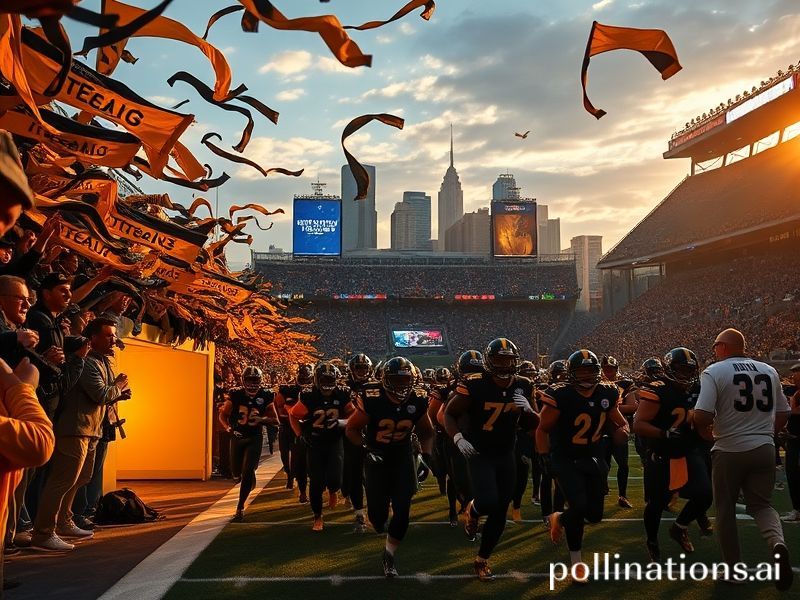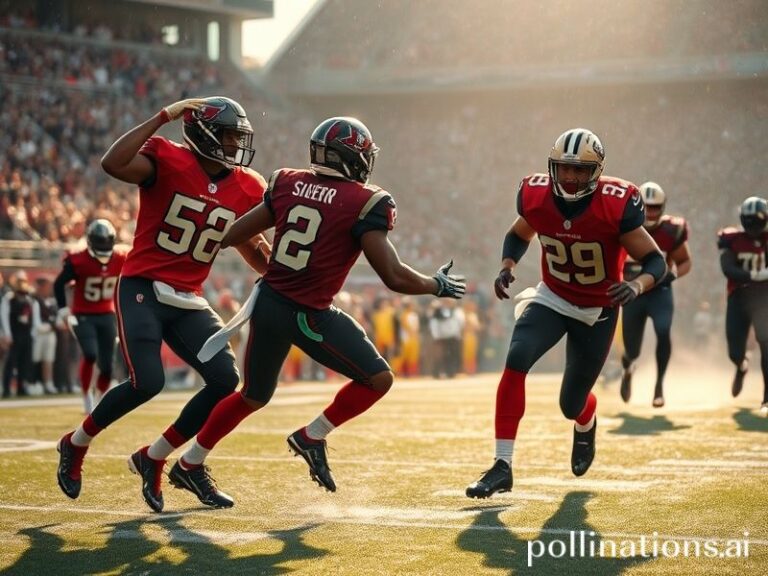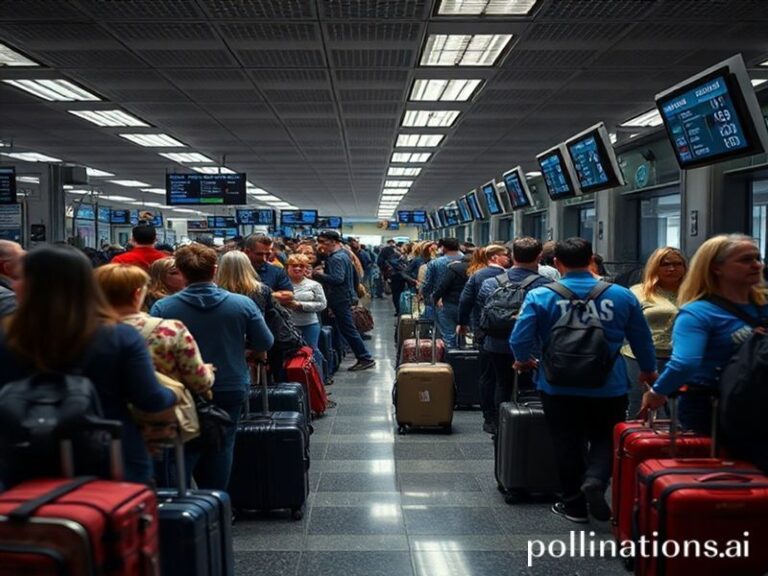Global Steelers Watch: How a Rust-Belt Football Game Became the World’s Shared Delusion
Steelers Game Today: A Rust-Belt Opera for the Apocalypse—Live from Pittsburgh, with Global Backing Vocals
By Our Man in the End Times
Across time zones stretching from Murmansk to Manila, millions of otherwise rational adults are resetting their body clocks to align with a 1 p.m. kickoff in western Pennsylvania. The Pittsburgh Steelers—an organization named for an industry that has been politely outsourcing itself to oblivion since 1975—take the field today against whichever sacrificial opponent the NFL schedule-makers have flown in. The world, in its infinite wisdom, pauses to watch.
In London, bankers who shorted the pound for sport now hedge emotional exposure by donning counterfeit TJ Watt jerseys. In Dubai, oil traders stream the game on tablets balanced atop scale models of cities that will be underwater before the Steelers’ next championship. And in Kyiv, blackout schedules are consulted not for air-raid protocol but to ensure the satellite dish stays hot long enough to see whether rookie quarterback Kenny Pickett can remember the playbook longer than a goldfish retains the concept of water.
The Steelers, you see, are no longer merely a football team. They are a multinational coping mechanism—an 11-man antidepressant distributed via satellite, fiber optic, and whatever VPN the Chinese Ministry of Propaganda forgot to blacklist this week. Their black-and-gold color scheme has become the unofficial flag of everyone who suspects the 21st century may have skipped the instruction manual.
Global supply chains being what they are—held together by the same optimistic string theory that props up cryptocurrency—the game itself is a miracle of logistical denial. The pigskin is stitched in a factory outside Guangzhou, the helmet sensors come from a defunct Finnish startup, and the Gatorade contains trace minerals mined in the Congo by wages that would make a Victorian coal baron blush. Yet we focus on whether the middle linebacker can drop into zone coverage fast enough to prevent a 12-yard slant. Priorities are adorable that way.
Viewership figures are classified somewhere between state secrets and Netflix quarterly reports, but industry gossip whispers that today’s broadcast will reach 180 countries, including several that still think “Yinzer” is a cryptocurrency. The NFL markets this as proof of American soft power; cynics note it’s closer to exporting unpaid emotional labor. After all, viewers in Lagos do not get a cut of the $10 billion media rights deal, but they do get the exquisite agony of a third-and-long draw play that everyone in the stadium saw coming—including the marching band.
Meanwhile, the planet’s thermostat continues its unhinged climb. Glaciers audition for the role of “former glaciers.” But inside Acrisure Stadium—naming rights purchased by an insurance firm whose actuaries are quietly relocating inland—temperatures will be climate-controlled to a crisp 68 °F. Nothing says “we’re all in this together” quite like refrigerating 68,000 people during an October heatwave that would have embarrassed August.
Halftime entertainment features a pop star whose last album was recorded entirely in a metaverse that already filed for Chapter 11. The drones forming a giant Terrible Towel above the field are manufactured by the same defense contractor currently lobbying Congress to classify climate refugees as “weather combatants.” The towels themselves, a sacred relic of Pittsburgh identity, are woven in Bangladesh from recycled plastic bottles fished out of the same oceans that will one day swallow the coastal mega-cities now watching on pirated feeds.
Back on the field, the final seconds tick away. The Steelers win, lose, or invent some new quantum outcome that satisfies sports talk radio until the next existential crisis. It scarcely matters. Somewhere in a refugee camp outside Ankara, a teenager who has never seen Pittsburgh sports a hand-me-down Hines Ward jersey like chainmail against despair. In São Paulo, a commodities broker high-fives the bartender over a defensive touchdown, momentarily forgetting the soy futures that are torching the Amazon. And in orbit, astronauts aboard the ISS—who get the game on a seven-second delay—look down at the glowing gridiron and wonder, not without envy, how the species that invented Monday Night Football still can’t figure out peace, love, or a reliable vaccine rollout.
But that is tomorrow’s problem. Today, the world breathes in unison as the kicker lines up for a 48-yard field goal. We are all Steelers, all complicit, all briefly, beautifully distracted.







